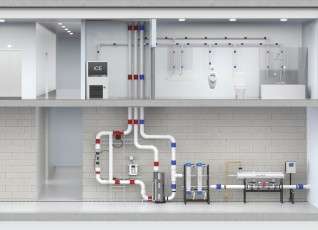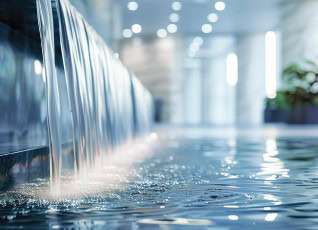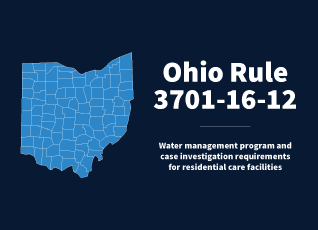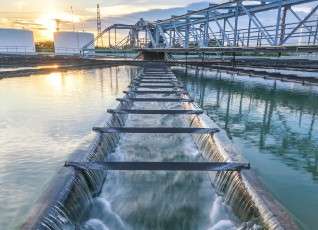Tap Into Your Water: Transform Care and ROI

Water is not just a utility in healthcare. It is a critical part of patient safety, operational performance, and financial stability. Yet, for many organizations, water risk remains hidden until it leads to a costly disruption or outbreak. For healthcare leaders, managing water is a strategic decision that protects patients, strengthens compliance, and safeguards margins. With a proactive, multi-barrier water management approach, hospitals can turn water into an asset that drives safety, resilience, and return on investment. Patient safety and experience Clean water drives safer care and better outcomes The challenge Waterborne pathogens like Legionella, Pseudomonas, and nontuberculous mycobacteria (NTM) are an often-overlooked source of healthcare-associated infections (HAIs). According to research, water can be a source for more than 20% of HAIs. These infections compromise patient safety, erode trust, and negatively affect patient experience scores such as HCAHPS. For healthcare, every infection linked to water systems represents both a human risk and a reputational liability. The impact Waterborne HAIs increase length of stay, reduce capacity, and can cause value-based reimbursement penalties. They can also create negative headlines that damage community trust and competitive standing. Over time, financial and reputational costs compound, diverting resources from growth, innovation, and patient care. The solution LiquiTech reduces infection risks at the source with a multi-barrier approach that removes sediment, eliminates pathogens, prevents regrowth, and protects plumbing infrastructure. This extends the life of water-bearing equipment, reduces energy inefficiencies, and creates a safer environment for patients and staff. Proactive protection helps preserve infrastructure, deliver better outcomes, safeguard reputation, and reduce operating costs. Financial margin protection Safety delivers measurable ROI The challenge Shrinking margins, labor pressures, and rising operational costs leave little room for unplanned crises. A single outbreak or infrastructure failure can drain millions in unbudgeted expenses and force capital reallocation away from strategic priorities. The impact Emergency remediation, litigation, reputational damage, and lost revenue from closed units or diverted patients all strain budgets. Premature infrastructure replacement or plumbing repairs further erode financial stability. These avoidable costs undermine investments in technology, workforce development, and patient care innovation. The solution LiquiTech protects financial margins by preventing outbreaks and extending the life of plumbing systems and equipment. Our solutions reduce emergency remediation, lower energy inefficiencies, and cut premature replacement costs. By reducing the total cost of risk, we free up capital to reinvest in advancing patient care, enhancing staff resources, and strengthening long-term financial performance. Regulatory compliance Compliance you can prove The challenge Organizations such as the Joint Commission, CMS, DNV, and ASHRAE require defensible water management programs with governance, monitoring, and testing. Without a comprehensive, verifiable plan, healthcare organizations face serious compliance gaps and increased risk during survey. The impact Survey failures can result in penalties, fines, or even loss of accreditation. Beyond the immediate financial consequences, non-compliance undermines leadership credibility and disrupts reimbursements. Gaps in documentation create unnecessary stress for staff and leadership alike. The solution LiquiTech designs and manages tailored water management programs aligned with every requirement. With monitoring, testing, and defensible reporting, you are always survey-ready, not just during inspections. This transforms compliance from a liability into a source of leadership confidence, reducing risk and freeing staff to focus on patient care. Enterprise risk and resilience Resilient hospitals start with resilient water The challenge Hospital operations rely on water for every function, from sterile processing to patient care. Yet risks often remain invisible until a crisis occurs. Outbreaks, pipe failures, or contamination events can rapidly shut down units and disrupt continuity of care, destabilize operations, and tarnish brand reputation for an entire organization. The impact Service interruptions force diversions, cancel procedures, and undermine trust with patients, staff, and communities. Each incident risks regulatory investigations, lawsuits, and reputational harm. When water systems fail, organizational resilience and the ability to deliver reliable care are compromised. The solution LiquiTech builds resilience into water systems with smart monitoring, rapid-response playbooks, and preventive strategies. By detecting risks early and ensuring infrastructure reliability, disruptions are minimized, equipment life is extended, and energy inefficiencies are reduced. This proactive approach ensures uninterrupted care, reputation, and operational resilience even when external pressures mount. Sustainability and ESG Safer for patients, smarter for the planet The challenge Hospitals face rising expectations to meet ESG goals while protecting patients and infrastructure. Traditional chemical treatments introduce harmful byproducts, accelerate corrosion, and increase energy demand and long-term costs, all while putting sustainability at odds with safety. The impact Chemical approaches are outdated, drive premature system failures, raise energy consumption, and create environmental hazards. They also raise concerns from patients, staff, and communities who expect environmentally responsible care. Failing to adopt sustainable practices risks reputational harm and higher operational costs. The solution LiquiTech’s multi-barrier approach eliminates pathogens without harmful byproducts. By reducing corrosion, extending equipment life, and lowering energy use, we protect both people and infrastructure. Our solutions help hospitals meet ESG goals while delivering safer, smarter, and more sustainable care. Tap into the hidden potential of water Water touches every part of your healthcare system, from patient safety and compliance to finances and sustainability. By managing it strategically, you can transform an overlooked operational risk into a driver of measurable improvement and resilience. LiquiTech’s multi-barrier solutions empower healthcare leaders to strengthen water safety, reduce costs, and protect their facilities for the future. It is time to take a proactive step Connect with our team today to learn how smarter water management can help your organization achieve safer care, stronger performance, and better ROI.
5 Reasons Water Management Programs Fail (and How to Fix Them Today)

Water Management Programs (WMPs) are critical for protecting people, maintaining compliance, and reducing risks from waterborne pathogens like Legionella. But having a program in place doesn’t always guarantee success. Too often, WMPs fail to deliver meaningful results, leaving facilities vulnerable to inspections, infections, and inefficiencies. Here are the five most common reasons water management programs fail and what to watch for if your plan isn’t delivering results. Fails to satisfy inspection Many facilities are surprised to learn that their water management program isn’t robust enough to pass surveyor review. Inspectors commonly find gaps in documentation, vague monitoring procedures, or missing risk assessments that don’t align with standards like ASHRAE 188, CMS QSO-17-30, or The Joint Commission. When this happens, facilities may face citations, corrective action plans, or even accreditation delays. Common inspection failures include: To avoid this, a WMP must be designed to be inspection-ready every day, with verifiable processes and measurable outcomes that demonstrate proactive water safety rather than reactive compliance. Not customized for the facility A common mistake is relying on generic, template-driven WMPs that don’t account for the specific risks of a facility. While a pre-packaged plan may seem convenient, it often overlooks unique features such as specific water system infrastructure and operation, water system layouts, patient areas and risks, water loops, underused outlets, decorative fountains, or cold-water risks. When programs are too broad, these vulnerabilities go unaddressed, leaving the building exposed. Signs your WMP may be too generic: Every facility has distinct infrastructure, occupancy, and water usage patterns, which means WMPs must be tailored to those factors. Customization not only ensures compliance but also makes the program meaningful and effective in reducing real-world risk. Busy work with no actionable insights Too many WMPs generate an overwhelming amount of monitoring data, temperature checks, flushing records, residual levels, without offering clarity on what the information means or how to act on it. This approach creates burdens for staff without actually improving safety. When teams are bogged down with busy work, they may miss critical warning signs, such as patterns of sediment buildup or declining disinfection performance. What to look for in a stronger WMP: A strong program transforms monitoring into insight, connecting data directly to actionable steps that reduce risk and improve outcomes. Not regularly updated A WMP that isn’t regularly updated quickly becomes irrelevant. Facilities evolve, new wings are added, plumbing systems are upgraded, staff change roles, and water chemistry shifts with municipal supplies. Yet many programs sit untouched for years, creating blind spots and outdated practices. Regulators increasingly expect to see when a plan was last reviewed, and outdated documents can raise red flags during inspections. When to update your WMP: A truly effective WMP is a living document, updated at least annually and whenever significant system changes occur, ensuring it reflects current infrastructure and the latest standards. Difficult to implement Even the most detailed plan is ineffective if it can’t be realistically implemented. Some WMPs are overly complex, requiring more resources than staff can reasonably provide. Others lack clear responsibilities or training, leading to confusion and missed steps. When implementation falters, facilities technically “have a plan” but fail to remain in compliance, exposing themselves to citations and safety risks. Barriers to effective implementation: The best programs balance detail with practicality, outlining achievable tasks that staff can confidently execute while providing the right tools and support to stay consistent. Strengthen your water management program today At LiquiTech, we understand the frustrations of ineffective water management programs, and we’ve designed our approach to overcome them. Our water management programs are: Your facility deserves more than a binder on a shelf. It deserves a water management program that protects patients, staff, infrastructure, and compliance every day. Connect with a LiquiTech expert today to learn how we can strengthen your water management program.
The Broader Impact of Effective Water Management

Water safety is often focused only on Legionella control, but an effective program can provide a much wider range of benefits. Water quality influences not only occupant health but also the performance of infrastructure, long-term sustainability goals, and financial outcomes. When facilities rely on outdated or incomplete water management strategies, they leave themselves vulnerable to risks that go well beyond Legionella. A smarter approach, grounded in a multi-barrier water management strategy, offers a way to protect people, extend equipment life, reduce operational costs, and support sustainability. Why traditional water treatment methods fall short Many facilities continue to lean on conventional practices such as flushing, temperature monitoring, and municipal disinfectant residuals. While these measures are widely used, they rarely address the real drivers of waterborne pathogen risk. Biofilm and sediment shield bacteria from disinfectants, temperature control is ineffective, cold water risks are overlooked, and flushing programs often require significant time and energy without producing lasting results. The cycle of monitoring and corrective actions that results from these methods is not just inefficient; it can mask bigger problems, such as hidden sediment accumulation or corrosion that undermines water quality throughout a building. The overlooked role of sediment Sediment is an underestimated challenge in building water systems. Sediment is naturally present in source water and often introduced through water main breaks, construction activity, or corrosion within pipes. Once inside, it quietly disrupts both water quality and infrastructure: Sediment-induced damage Broader impacts on facilities Poor water management is not just a safety concern; it affects every part of a facility’s operation. This interconnected risk landscape is why leading facilities are rethinking their approach with multi-barrier solutions that go beyond Legionella and compliance. Smarter water management A multi-barrier approach layers proven technologies with expert service to create a comprehensive, defensible water management strategy. Together, these measures protect both people and infrastructure: These technologies are integrated into a program supported by data analytics and remote monitoring, ensuring that facility teams can act proactively instead of reactively. Real-world results The benefits of this approach are measurable. In one academic medical center, implementing a multi-barrier solution allowed hot water heaters to be lowered from 160°F to 125°F while still achieving non-detect Legionella results, cutting energy use by 50%. Another facility reduced sediment loads by nearly 98%, preventing costly pump failures and improving system reliability. Even more importantly, infection risk was significantly reduced. One facility saw complete elimination of Pseudomonas, Acinetobacter, and Stenotrophomonas detections, improving patient safety and reducing the burden of HAIs. Rethink water safety for the future Water is more than a utility; it’s a clinical, operational, and financial risk factor. By addressing underlying issues like sediment and biofilm with smarter, layered protection, facilities can safeguard their people, extend equipment life, and achieve long-term results. If your current water management strategy feels like a cycle of short-term fixes, it may be time to take a smarter approach. Connect with a LiquiTech water safety expert today to explore how a multi-barrier strategy can transform your facility’s water quality and performance.
Multi-Barrier Approach: Setting a New Standard for Water Safety

Healthcare facilities today face increasing water safety risks. Aging infrastructure, frequent water main breaks, and elevated sediment levels are straining plumbing systems and creating ideal conditions for waterborne pathogens to thrive. Municipal treatment processes, while essential, often don’t address these downstream challenges once water enters a facility. The result is a growing concern for occupant safety, equipment reliability, and compliance. One healthcare facility confronted these realities head-on after dealing with Legionella positivity in its cold-water system, as well as recurring detection of Pseudomonas, Acinetobacter, and Stenotrophomonas. Beyond microbial risks, high sediment loads from the municipal water supply were causing significant damage to plumbing infrastructure, increasing maintenance costs, and accelerating corrosion. Traditional remediation approaches were unable to deliver sustainable results. The Challenge The facility needed a comprehensive strategy that could both eliminate pathogens and reduce the environmental conditions that allowed them to flourish. The solution: A multi-barrier approach To address these challenges, LiquiTech implemented a multi-barrier water treatment solution designed to deliver layered protection: Together, these technologies worked in synergy to address the root causes of water quality problems and provide sustained protection. The results By addressing microbial challenges, sediment-related damage, and infrastructure reliability together, the facility established a new standard of care for water safety. The solution not only safeguarded patients and staff but also delivered measurable operational and financial benefits. Connect with an expert Fill out the form below to connect with a LiquiTech expert to explore how a multi-barrier water treatment approach can help protect your facility’s water, systems, and ROI.
Healthcare Solutions: How to Reduce Waterborne Pathogen Risk

In healthcare settings, it is crucial to take every precaution to ensure patient safety and well-being, including the quality of water used throughout the facility. Waterborne pathogens, commonly present in building water systems, can pose serious health risks, particularly to individuals with weakened immune systems. This blog post will delve into common waterborne pathogens, their effects, and the preventive measures necessary to maintain safe water in healthcare environments. Understanding common waterborne pathogens and their impact Waterborne pathogens are microorganisms that thrive in water systems and can cause severe infections. Healthcare facilities, with their complex and extensive water systems, provide an ideal environment for these pathogens to proliferate. The presence of immunocompromised patients and the use of medical devices that rely on water further increase the risk of infections. Awareness and proactive management, including regular water testing, system maintenance, and the implementation of effective disinfection protocols, are essential to prevent outbreaks and protect patients and staff. Legionella Legionella bacteria can thrive in complex water systems, such as those found in hospitals. These bacteria can cause Legionnaires’ disease, a severe form of pneumonia. Legionella is primarily transmitted by inhaling small water droplets containing the bacteria, which can occur through showers, cooling towers, and decorative fountains. Aspiration of contaminated drinking water can also lead to infection. Regular assessment and maintenance of water systems are crucial to preventing Legionella growth. This includes routine cleaning and disinfection of cooling towers and decorative fountains. Copper-silver ionization, a method that continuously disinfects potable water, has proven effective in controlling Legionella populations. Having a robust outbreak response plan is essential. This includes rapid identification of suspected Legionnaires’ disease cases, patient testing, and environmental sampling for Legionella. Quick action can help contain the spread and prevent further infections. Pseudomonas Pseudomonas, particularly Pseudomonas aeruginosa, thrive in moist environments. It can be found on medical equipment and in water sources, posing significant risks to patients, especially those with weakened immune systems. In healthcare settings, Pseudomonas can lead to various infections, including pneumonia. Effective water management, monitoring, rigorous cleaning, and disinfection protocols are vital to controlling Pseudomonas. Regularly disinfecting sinks, showers, and medical devices that come into contact with water can significantly reduce the risk of infection. Ensuring that all equipment is thoroughly sterilized is also crucial. Healthcare providers should be vigilant for symptoms of Pseudomonas infections, particularly in critically ill or post-surgery patients. Early detection and prompt treatment can prevent complications and improve patient outcomes. Stenotrophomonas Stenotrophomonas maltophilia (S. maltophilia) is a growing concern in hospitals due to its multidrug resistance. This organism often causes healthcare-associated infections (HAIs), affecting patients with compromised immune systems or those with indwelling devices like catheters and breathing tubes. S. maltophilia’s resistance to many common antibiotics makes infections challenging to treat. Understanding its resistance patterns is crucial for effective treatment. Physicians must stay informed about the latest guidelines and treatment options. To limit the spread of S. maltophilia, implement effective water management strategies, perform strict environmental monitoring, and implement disinfection procedures. Hand hygiene and device sterilization play a significant role in preventing transmission. Regular audits and staff training can help maintain high hygiene standards. Acinetobacter Acinetobacter baumannii is notorious for its resilience against antibiotics. This highly antibiotic-resistant pathogen often affects patients in intensive care units (ICUs) or those with compromised immune systems, leading to severe infections. Rigorous infection control measures are necessary to combat Acinetobacter. This includes water management practices, regular handwashing, sterilizing equipment, and implementing isolation protocols for affected patients. Preventing outbreaks requires a coordinated effort from all healthcare staff. Proactive surveillance for Acinetobacter is critical. Regular screening and monitoring can help detect infections early. Judicious antibiotic use, guided by susceptibility testing, is also key to managing its spread and improving patient outcomes. Solutions for healthcare facilities Waterborne pathogens pose a significant threat to healthcare facilities, but with proper awareness, preventive measures, and a coordinated effort from all healthcare staff, their impact can be minimized. By understanding the risks and implementing effective strategies, like water management programs, regular maintenance of water systems, rigorous infection control protocols, and proactive surveillance, we can ensure safer water systems and improve patient and staff safety. Our solutions, including copper-silver ionization, are effective against a broad spectrum of pathogens, including those discussed here. Implementation of these strategies can significantly reduce the risk of infection from water sources. Learn more about how healthcare facilities partner with LiquiTech or contact us today to explore our water treatment solutions designed to protect your patients and staff.
The Future of Plumbing: Smart Technologies for Better Water Management

The plumbing industry is undergoing a technological transformation. Aging infrastructure, evolving regulations, and increasing health risks necessitate a shift toward smarter, data-driven water management solutions. These innovations can improve water quality, optimize system performance, and enhance occupant safety. This blog explores how smart plumbing technologies are shaping the future of building water systems, offering practical insights for implementation. Challenges facing building plumbing systems Source water quality often declines as it travels through a building’s plumbing system, impacted by factors like sediment, biofilm, temperature fluctuations, and disinfectant loss. Disruptive events—such as water main breaks, construction, or hydrant flushing—can stir up sediment and biofilm, introducing these contaminants into the building. Once inside, the situation can worsen due to aging infrastructure, inconsistent temperatures, and water stagnation. Pressure put on building water systems: Addressing these challenges requires proactive solutions grounded in strong water management principles. Key principles of effective water management A comprehensive water management strategy builds resilience, reduces risks, and ensures regulatory compliance. The core principles include: Risk assessment Control measures Monitoring and documentation Interventions and corrective actions These principles create a foundation for incorporating advanced smart technologies into plumbing systems. The role of smart technologies in building water management Smart technologies bring automation, real-time data, and predictive analytics to water management, making systems safer, more efficient, and easier to manage. Key innovations include: Smart sensors Programmable flushing devices Advanced water treatment technologies The following technologies offer real-time water management, adjusting automatically based on water conditions and ensuring optimal system performance. Benefits of smart plumbing systems The advantages of implementing smart plumbing technologies go beyond regulatory compliance: Get started with smart plumbing technologies Adopting smart technologies requires strategic planning. Here’s how to begin: Embracing the future of plumbing The plumbing industry is evolving, and smart technologies are leading the way. These tools empower facility managers and engineers to proactively address water system challenges, ensuring safer, more efficient, and compliant operations. Now is the time to invest in the future of water management. By adopting smart technologies, you can enhance occupant safety, optimize operations, and create resilient systems. Ready to step into the future? Contact LiquiTech today to explore how our smart technologies can transform your building’s water management.
Report: Gaps in Water Management Programs and Increased Risks

A well-structured and implemented water management program (WMP) is crucial in controlling Legionella and other waterborne pathogens. Recent research has identified common gaps in water system management that may increase the risk of Legionnaires’ disease outbreaks. By understanding these areas and applying proactive solutions, facility teams can strengthen their WMPs and better protect building occupants. Key findings from recent research A comprehensive study published in Microorganisms analyzed over 220 Legionnaires’ disease outbreaks and found that nearly 90% of cases were linked to preventable issues within building water systems (Dooling et al., 2021). This study, along with a recent CDC report, highlights areas where water management programs can be improved to better control Legionella growth (CDC, 2024). The research found that many outbreaks stemmed from a combination of system design flaws, operational lapses, lack of systemic documentation, and insufficient oversight. Specifically, the following challenges were identified: Facilities like healthcare institutions, hotels, senior living communities, and large commercial buildings are particularly at risk due to the complexity of their water systems and the presence of vulnerable populations. By recognizing these common challenges, organizations can take meaningful steps to enhance their water safety efforts. Strengthening water management programs Effective water management programs require consistent oversight to ensure that all activities are carried out as defined in the plan. When any part of a water management plan is not fully implemented, it may leave building occupants vulnerable to potential health risks and expose building owners to legal and reputational consequences in the event of a disease case or outbreak. The CDC and ASHRAE Standard 188 provide guidance on best practices, and applying these recommendations consistently can help mitigate risks. Key strategies for strengthening WMPs include: Strengthen your water management program A well-maintained and properly executed water management program is one of the most effective ways to prevent Legionnaires’ disease outbreaks. By proactively addressing gaps in water safety protocols, facilities can better protect their occupants and maintain compliance with public health standards. Ensuring the safety of building water systems requires ongoing effort and expertise. Schedule a consultation with LiquiTech today to learn how our proven solutions can help your facility strengthen its water management program and reduce Legionella risk. Sources
“Spring is here—and so is Legionella risk,” warns expert

As the weather warms up, many healthcare facilities prepare for seasonal changes in staffing, patient volumes, and operations. But one area that often gets overlooked during this transition is your building water system—and spring can bring a perfect storm of conditions that elevate the risk of Legionella and sediment-related issues. “Spring is here—and so is Legionella risk,” says Dave Pierre, building water safety expert at LiquiTech. “Warmer temperatures, shifting water demand, and municipal activity like hydrant flushing create ideal conditions for both bacterial growth and sediment intrusion in building water systems.” Five spring risk factors impacting water safety Here are five reasons why spring poses increased water safety risks: Warmer weather raises cold water temps With rising outdoor temperatures, cold water lines—especially those in sun-exposed or poorly insulated areas—can warm into the ideal Legionella growth range (77–113°F). Even in well-designed systems, this shift can allow bacteria to multiply in areas not typically considered high-risk. UV disinfection on the incoming water supply can help kill bacteria before it enters your building, while systemic disinfection methods such as copper-silver ionization can prevent bacteria from growing and spreading in warm, low-flow areas within your plumbing. Together, these technologies offer a multi-barrier solution to address both external and internal risks. Seasonal water quality changes increase microbial activity Spring runoff and heavy rains can significantly impact source water quality by increasing turbidity, organic matter, and nutrient load in the municipal supply. These changes can strain municipal treatment processes and often result in lower chlorine residuals and increased microbiological activity in the water entering your facility. This weakens your first line of defense against waterborne pathogens like Legionella. UV disinfection helps reduce microbial load before it enters the building, while systemic disinfection technologies provide ongoing protection throughout your plumbing system. Municipal disruptions introduce sediment Spring is prime time for municipal hydrant flushing and water main repairs. These activities can stir up sediment and contaminants in the public water supply, which then make their way into your building. Sediment doesn’t just reduce disinfectant effectiveness—it can also feed bacterial growth, damage water-bearing equipment, and even lead to pipe leaks or system failures. Sediment filtration on the incoming water supply helps prevent sediment from entering the building, protecting plumbing infrastructure and supporting overall water quality. Changing demand patterns stress plumbing Spring often brings changes in how different parts of a facility use water. Higher demand from increased patient volumes, reopened services, or seasonal water systems (e.g., cooling towers, irrigation systems, and outdoor water features) can cause pressure fluctuations and temperature shifts that disturb biofilm and mobilize bacteria. On the flip side, lower or inconsistent usage in certain areas can lead to stagnation, loss of disinfectant residuals, and unchecked Legionella growth—especially in places like handwashing sinks or infrequently used showers. Smart sensors throughout the plumbing system can help monitor these changes in real time, identifying abnormal flow patterns, temperature inconsistencies, and other early warning signs of system imbalance—so you can take corrective action before issues escalate. Stagnant water in underused areas Units that saw minimal use during the winter—like seasonal wings, outpatient areas, or overflow rooms—may still have stagnant water sitting in the plumbing. Without proper flushing and maintenance, that water can harbor biofilm and Legionella, and turning those outlets back on can send contaminated water into patient areas. Point-of-use filters offer immediate protection at faucets and showers, while flushing protocols guided by your water management program can help clear stagnant water safely. What to do next Spring is the ideal time to review your water management plan and ensure it addresses seasonal risk factors like temperature fluctuations, sediment intrusion, and changing water use patterns. A targeted water system risk assessment can help identify vulnerabilities and confirm that your plan includes the right preventive measures—such as flushing procedures, filtration strategies, monitoring points, and disinfection methods—for this time of year. Making these updates now can help reduce the risk of Legionella growth, protect your patients, and prevent costly equipment damage tied to sediment and system imbalances. Need support evaluating your water management plan this spring? Our team of water safety experts is here to help, contact LiquiTech today.
Update to Ohio Rule 3701-16-12: Water Management Programs and Case Investigations Now Required for Residential Care Facilities

Effective July 12, 2024, Ohio introduced updates to Rule 3701-16-12 of the Ohio Administrative Code, which requires residential care facilities to have protocols for investigating cases of Legionnaires’ disease and implementing a water management program to control Legionella and other waterborne pathogens. Water management program implementation Every residential care facility in Ohio must establish and implement an effective water management program to: Why this matters Waterborne pathogens, particularly Legionella, can cause Legionnaires’ disease, a severe type of pneumonia that spreads through contaminated water systems. Older adults and individuals with weakened immune systems—many of whom reside in assisted living facilities—are at higher risk of infection. Without proper water management, Legionella bacteria can grow in: An outbreak of Legionnaires’ disease can be deadly, cause legal liability for facilities, and damage trust with residents and their families. Legionnaires’ disease case investigation procedures Alongside prevention, facilities must be prepared to respond swiftly and effectively when a suspected or confirmed case of Legionnaires’ disease arises. The rule requires facilities to: These steps help contain the risk, prevent further infections, and strengthen the facility’s overall water safety strategy. How to comply with the requirements To comply with the water management program and case investigation requirements, residential care facilities should: A proactive approach to resident safety By requiring water management programs and case investigation procedures, Ohio’s updated Rule 3701-16-12 aims to reduce the risk of deadly waterborne infections in residential care facilities. Compliance with this rule is a critical safety measure that protects residents, staff, and visitors from illness. Ready to get started? Contact LiquiTech today to see how we can help your facility comply with Ohio Rule 3701-16-12 and protect your occupants.
From Source to Tap: Navigating Building Water Quality

Water traveling from municipal sources to a building’s taps undergoes a complex journey influenced by everything from the quality of the source water to the building’s internal distribution network. Even water that meets national safety standards can encounter challenges as it passes through aging pipes, is affected by shifting climates, and interacts with building infrastructure. Understanding these factors—and taking proactive steps to address them—is essential for ensuring safe, reliable, and sustainable water. Understanding source water quality The foundation of safe drinking water in the U.S. is the Safe Drinking Water Act (SDWA), which mandates the EPA to set health-based standards for public water supplies. While compliance with SDWA ensures water is safe to consume, it doesn’t guarantee that water entering a building’s plumbing system is free of all contaminants or pathogens. Once water leaves the municipal water treatment plant and enters the distribution system, the quality of the water can change drastically before it reaches a building, leaving building water systems susceptible to issues like scale, corrosion, and even microbial growth. Growing challenges influencing source water quality Leveraging water quality reports Consumer Confidence Reports (CCRs) are annual water quality reports issued by municipalities to inform consumers about the safety and quality of their drinking water. By reviewing these reports, engineers and facility managers can anticipate challenges such as scaling, corrosion, or bacterial growth and adjust water treatment protocols accordingly. How source water quality impacts buildings Solutions for optimal water quality To mitigate risks and ensure high-quality water throughout building systems, you must adopt proactive and multi-faceted strategies. Here are some proven solutions: 1. Supplemental disinfection systems: Installing secondary disinfection systems can help control microbial growth beyond the municipal supply. Options like UV disinfection can target pathogens like Legionella without contributing to harmful DBPs or accelerating corrosion. 2. Flushing programs: Regular flushing of plumbing systems removes stagnant water, sediment, and biofilm. A well-designed flushing program includes low-use fixtures, distal outlets, and hot water recirculation loops to prevent microbial growth and ensure disinfectant efficacy. 3. Sediment filtration: Point-of-entry sediment filtration systems capture particulates and sediment before they enter the building’s plumbing, reducing strain on equipment, minimizing scale formation, and improving water clarity. 4. Water softeners: By reducing hardness, softeners prevent scaling and improve the efficiency of water-dependent systems. This is particularly critical in areas with high sediment or hard water. 5. Smart monitoring: Modern IoT-enabled sensors can provide real-time insights into water quality metrics such as temperature, pH, chlorine residuals, and microbial activity. Automated alerts enable facility teams to respond quickly to emerging issues. Standards, best practices, and emerging trends Standards and best practices Several modern guidelines provide a framework for water quality management: Emerging trends Making water quality a strategic priority Water quality is not just a technical challenge—it’s a strategic priority. Poor water quality can compromise building performance, increase operational costs, and endanger occupant health. By leveraging tools like CCRs, adhering to best practices, and investing in advanced water management solutions, you can ensure that your water systems deliver safe, efficient, and sustainable water. Partner with LiquiTech to lead the way in advanced water intelligence. Together, we can transform your building’s water systems. Contact us today to get started.